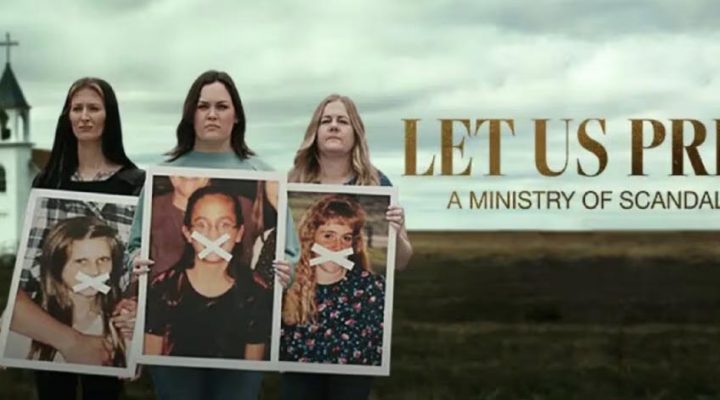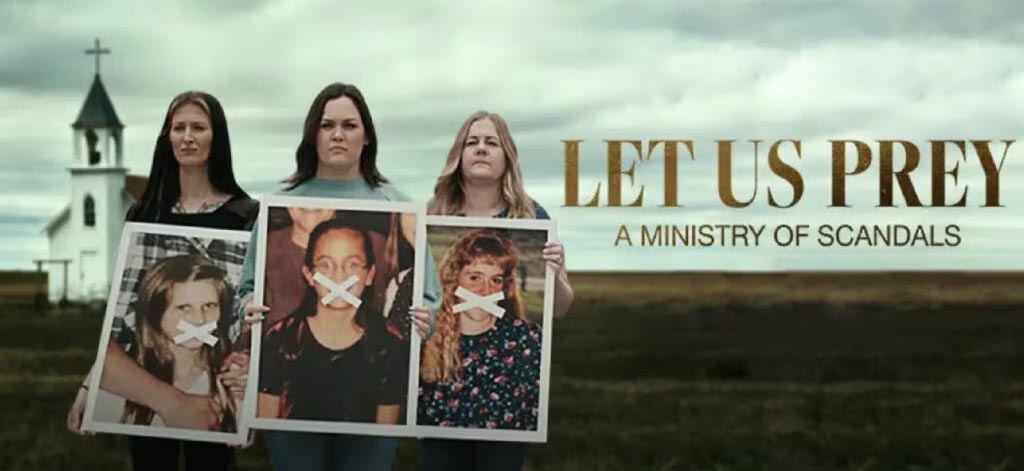“Every IFB church is a powder keg ready to explode,” says Eric Skwarczynski on Let Us Prey: A Ministry of Scandals, which released last weekend on HBO Max and Investigation Discovery. The four-part docuseries follows the stories of sexual abuse survivors within the Independent Fundamental Baptist church movement, which is made up of 6,000 congregations with about 8 million members.
Viewers will be reminded of similar IFB ministries from Amazon Prime’s Shiny Happy People that released in June. But the blunt communication and sexually focused themes of Let Us Prey make this docuseries very difficult to watch at times.
Still, survivor Ruthy Heiler believes these stories need to be shared for the sake of other young girls who are still suffering.
“I’m doing what I need to do to protect other girls because I don’t think men are just going to stop abusing young girls in the IFB,” she states. “I’m more empowered than ever to get help to those girls wherever they may be.”
If Heiler’s story is to be believed, then Skwarczynski’s claim about IFB churches being powder kegs ready to explode is no exaggeration. The questions we need to ask ourselves are where the IFB movement came from, what makes it so volatile, and how widespread its dangerous theology is in broader evangelicalism.
Separating from national Baptist conventions

J. Frank Norris
Independent Fundamental Baptists can be traced back to the late 19th and early 20th centuries as a reaction to modernism and theological liberalism they feared were seeping into the national Baptist denominations. J. Frank Norris started the Fort Worth, Texas, based World Baptist Fellowship in 1933, while the Baptist Bible Fellowship International began in 1950.
Many churches simply exited the Southern Baptist Convention without joining any other fellowships and identified themselves as IFB.

Jack Hyles
Let Us Prey traces the IFB movement back to Jack Hyles, who was pastor of First Baptist Church in Hammond, Ind., from 1959 to 2001. Sarah Smith, a reporter with the Houston Chronicle, explained: “In 1959, he decided to break away from all the formal Baptist denominations to be independent. First Baptist Hammond became pretty much the mothership for the IFB.”
“The IFB movement was reactionary to what they deemed liberalism within the Southern Baptist Convention,” Skwarczynski added. “Culture was changing. We were losing that 1950s American values and people were getting nervous. And when a culture’s extremely nervous, it gives someone a chance to come in and say, ‘I’m going to fix this.’”
Sacralizing male power
At some point in every documentary about church abuse, there has to be an illustration of hierarchy with men being positioned over women and children. You’d think eventually we’d start to notice the pattern.
“The IFB is a man’s world,” Skwarczynski explains. “Men are the only ones able to have positions of power. Men are the only ones that are allowed to preach.”
Heiler echoes, “Men were held on a pedestal, especially men in positions of church authority.”

Eric Skwarczynski
Unfortunately for women, the IFB world of male power extends beyond the church walls and into the home. In one scene reminiscent of Voddie Baucham’s theology of stay-at-home daughters, Amanda Clidence says, “Your father in a sense owns you until he hands your possession off to your groom. You are owned by men in the IFB.”
Seducing children with excitement
Adults understand if a stranger invites you into their van by luring you with candy then it’s time to run away. But what if a pastor invites you into his church bus by luring you with excitement?
Clidence says: “Our bus captain had us going door to door to witness. He said, ‘Amanda, do whatever it takes to get those girls on the bus.’ Sometimes we’d have goldfish and we’d entice the kids, saying, ‘Hey, if you come on the bus, we’re going to have people swallow the goldfish live.’”
It’s the same tactics Good News Clubs wield to trick kids into coming to their events.
Silencing and subordinating women and children
Once women and children agree to walk through the doors, they are quickly placed in their positions of silence and subordination below men on the hierarchy.
Let Us Prey shows Hyles’ successor, Jack Schaap, saying: “The reason your sorry soul’s going to hell is because a woman told Adam what God thinks about things. I wouldn’t get my theology from a woman.”
Michael Easter, pastor of Peoples Baptist Church in Folkston, Ga., adds: “It’d be a good idea when your wife starts that, ‘I just don’t like this. I just don’t like that,’ for you to turn around and look her right in her God-given eyeballs and say, ‘Shut your mouth!’ Just shut up!’”
As if it weren’t enough to silence their own IFB wives and daughters in the church and home, they also want to silence and subordinate all women by excluding them from the workplace and the polls. Steven Anderson, pastor of Faithful Word Baptist Church, asks, “What do you think they mean when they say women’s rights? You know what they mean?”
Then he answers: “The right to rebel and disobey your husband. The right to divorce him. The right to go out and get a job and make your own money. The right to tell him what to do. The right to go vote for our leaders as if women should have any say in how our country is run.”
Adult women are treated as children, and neither have a voice.

Secluding church members and churches
Because these churches are independent entities, the senior pastor is accountable to nobody outside of his church walls. Each church is an isolated silo, with its members falling in line under the authority of the men and ultimately the pastor.
Yet, like the New Apostolic Reformation, the senior pastors of the IFB are a highly networked circle of independent institutions. So when one of their staff members commits sexual abuse, the senior pastors have the network in place to shuffle the abusers around without notifying any authorities.
Let Us Prey shows how abusers in church power often groom their victims by telling them if they report the abuse, then they’ll be ostracized and treated as the black sheep of the church.
Like the Association of Certified Biblical Counselors, IFB churches demonize talking with mental health professionals. So the only person one feels they can approach about their abuse is the senior pastor, who thinks he has all the answers despite having zero training in mental health.
 The result is vulnerable people feel like isolated individuals within isolated churches, with seemingly nowhere else to go for help.
The result is vulnerable people feel like isolated individuals within isolated churches, with seemingly nowhere else to go for help.
Ironically, at one moment in Let Us Prey when one of the women tries to talk to First Baptist Church of Hammond, Ind., the church says to her: “The police are on their way. We have to ask you to leave.” While the church was unwilling to call the police to report her abuse, they quickly called the police to report her presence. As a result, survivors have nowhere to go, including even to the church itself.
Spanking children to create soldiers and housewives
IFB churches love to gloat about their training children through violence. While the docuseries depicts such tactics as food and water depravation or isolation rooms, perhaps the most common discipline tactic is spanking.
The purpose of the physical pain is to break the child’s will in order to make them submit to the adult’s desires. And this pain is typically given by spanking kids on their butts. While there is debate over whether or not spanking on the buttocks could be considered a form of sexual abuse in itself, I believe there is some merit to this idea. When I was spanked at my school by my teacher as a 7-year-old, the trauma I felt wasn’t as much about the spanking itself as it was about having to pull my pants down to show her my butt in the school closet.
 By beating the child’s will down, IFB adults are able to form them into their gender roles. Faith Baptist Church, one of the churches highlighted in Let Us Prey, divides boys and girls into two specific groups. The “Baptist Boys Battalion” is designed for boys “to learn how to have grit, be tough and endure hardness as a good soldier” for Jesus. The “Blue Denim & Lace” club is designed for girls “to instill a blend of grace, truth strength, beauty and honor.” While the boys are decked out in camouflage, the girls are wearing dresses and surrounded by balloons. Each group has been beaten down into the particular gender mold the men of their church desire.
By beating the child’s will down, IFB adults are able to form them into their gender roles. Faith Baptist Church, one of the churches highlighted in Let Us Prey, divides boys and girls into two specific groups. The “Baptist Boys Battalion” is designed for boys “to learn how to have grit, be tough and endure hardness as a good soldier” for Jesus. The “Blue Denim & Lace” club is designed for girls “to instill a blend of grace, truth strength, beauty and honor.” While the boys are decked out in camouflage, the girls are wearing dresses and surrounded by balloons. Each group has been beaten down into the particular gender mold the men of their church desire.
Ultimately, IFB pastors and parents show how their violence against children points to God’s violence against children. At one point, Schaap is seen whittling a stick in the pulpit while saying, “I hold the knife, you submit. I hurt. You say, ‘Thank you.’”
Scaring survivors with threats of hell
I remember being told at 4 years old that I was so sinful I deserved to burn in hell for eternity. And my 2-year-old brother was in the room at the time.
“I remember being told at 4 years old that I was so sinful I deserved to burn in hell for eternity.”
Amanda Householder has a similar memory from her experience in IFB Christianity. “I just remember being a kid and dreaming of burning in hell, like burning in hell for eternity,” she recalls.
When abusers start to fear they may be reported to the police, they use the children’s compassion for their neighbor against them in order to protect themselves. One abuser says, “If we call the authorities, then the church will be investigated, we could lose the Christian school, we could lose the bus ministry.”
All that is code for the idea that those whom the church is reaching will go to hell one day if sexual abuse is reported.
Justice is handing back self-worth
The message of this theology is that the only thing you are worthy of is to be physically suffering violence at the hands of your spiritual authorities and at the hand of God. If that’s not a powder keg of sexual violence ready to explode, then I don’t know what is.

Nanette Miles
Kathy Durbin recognizes how these men take self-worth. “I realized what Paul Fox took from me was my self-worth,” she says. “And whatever was left, (Bruce) Goddard took.” Goddard is a pastor featured in the documentary who allegedly covered up sexual abuse committed by his youth pastor.
So for Durbin, justice is the restoration of self-worth. She explains, “What the D.A. is doing is handing it back to me because they said, ‘You’re worth justice.’”
This is why for those of us who want to help these women pursue justice, the task is far more than merely putting a few men here and there in jail. To make things right for these women is to help them heal toward self-worth.
That’s why there has to be a complete theological reckoning. The entire IFB theology of sacralized male power, deceptive evangelism, complementarianism, isolationism, physical violence and threatening hell needs to be deconstructed because those are the theological walls these men build in order to diminish the self-worth of women and children and then keep them under their watchful and controlling eye.
The conservative resurgence of the SBC
One danger in a docuseries like Let Us Prey is that many of the examples shown are so extreme it becomes easy for less-extreme conservatives to think they don’t have the same problems. But while IFB churches and fellowships may have come out from the SBC due to what they perceived to be liberalism, the reality is the SBC has moved back toward the IFB through the conservative resurgence.
Consider a recent filing in the federal lawsuit brought by former SBC President Johnny Hunt, where the alleged victim of abuse and her husband were warned they could not speak of the allegations against Hunt because it would reflect poorly on the SBC.
“When women are being told they have no power, and when men are given all the power, it’s the perfect storm for sexual abuse.”
Skwarczynski says, “When women are being told they have no power, and when men are given all the power, it’s the perfect storm for sexual abuse.”
And while that’s true, the theological framework that supports violence over others goes far beyond simply complementarianism. It’s the entire conservative evangelical system of relationship through submission to male power and of justice through violence against human bodies.
Thanks to Al Mohler, the SBC now fully promotes each of the theological pillars Let Us Prey demonstrates to be ingredients in the powder keg of IFB sexual abuse. And that is why the SBC, and other conservative denominations like it, are mired in sexual abuse.
Come out from among them and be separate
One of the IFB’s favorite passages in the Bible is 2 Corinthians 6:17, which states, “Wherefore come out from among them, and be ye separate, saith the Lord.”
Perhaps one of the greatest frustrations I had in watching Let Us Prey was not only seeing the abusers go from IFB church to IFB church, but watching the survivors go from IFB church to IFB church as well. Another frustration is seeing survivors go from IFB churches to seemingly less-extreme SBC churches that hold to the same theology and are mired in the same abuse scandals.
If there is one encouragement I could share, perhaps it would be a nudge to listen to the one passage that always was used to keep us in. “Come out from among them.” It’s time to stop going from one conservative church to another. It’s time to separate ourselves from them.
2 Corinthians 6:18 says when we do, God “will be a Father to you, and you will be my sons and daughters.”
No matter how dark and scary things may feel within the IFB or the SBC’s dark towers, there is life outside their walls. Losing that space may be terrifying when it’s all you know. But the air is fresh outside. And God can be experienced as a Father outside.
As April Avila puts it: “All these things I was so scared, like if I say anything, I will lose all this. What I didn’t realize was that all that stuff, I needed to lose. It was toxic. And what I gained, the freedom to speak out, I gained so much more.”

Rick Pidcock
Rick Pidcock is a 2004 graduate of Bob Jones University, with a bachelor of arts degree in Bible. He’s a freelance writer based in South Carolina and a former Clemons Fellow with BNG. He completed a master of arts degree in worship from Northern Seminary. He is a stay-at-home father of five children and produces music under the artist name Provoke Wonder. Follow his blog at www.rickpidcock.com.
Related articles:
Another alarm sounds on clergy sex abuse: Will Southern Baptist leaders just hit snooze again? | Opinion by Christa Brown
I survived the Christian fundamentalist world that created Josh Duggar | Opinion by Lydia Joy Launderville
As a religious abuse survivor, this is my message to Baptist pastors | Opinion by Lydia Joy Launderville


